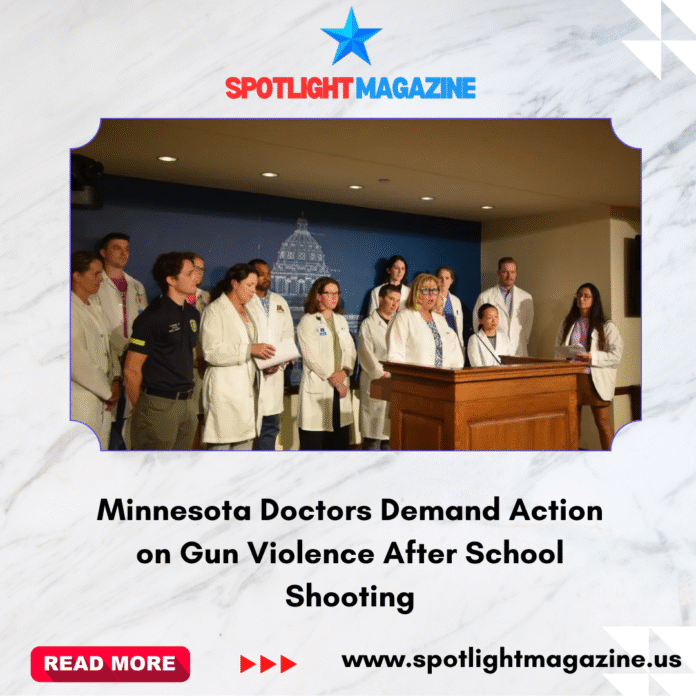Minnesota health care leaders gathered at the State Capitol on Thursday urging Gov. Tim Walz to call a special legislative session on gun violence, more than a month after the tragic shooting at Annunciation Catholic Church and School in Minneapolis. Doctors who treated the victims of that shooting joined the call, saying stronger gun laws are urgently needed to prevent further tragedies.
The medical community is asking lawmakers to adopt four specific measures: banning assault-style weapons, banning high-capacity magazines, requiring safe gun storage, and repealing a state law that prevents cities from passing their own gun control policies.
Dr. Lisa Mattson, president of the Minnesota Medical Association, made it clear that doctors view the issue as urgent. “This is no longer a friendly request from their local doctors,” she said. “This is a demand from tens of thousands of physicians across the state who know firearm violence for what it is: a public health crisis.”
The physicians present said they are in conversations with lawmakers, but progress has been slow. Dr. Janna Gewirtz O’Brien, president-elect of the Minnesota Chapter of the American Academy of Pediatrics, said she hears “a whole lot of empathy and not a lot of action.” She added, “Sometimes politics gets in the way of good sense.”
Gov. Walz, speaking at an unrelated press conference, said he is still working on the issue but did not commit to calling a special session. Negotiations between Democrats and Republicans in the legislature collapsed earlier in the week, with leaders admitting they had reached a “clear impasse.” Democrats made one of their offers public, which included Republican proposals on school safety and mental health, but Republicans’ counteroffer has not been shared. Walz criticized the lack of compromise, saying Republicans’ proposal “totally missed” any mention of gun control.
“If we’re going to come back in a special session and address what the public clearly wants, we need to discuss the whole spectrum of issues,” Walz said. “For us to come back in and give Republicans everything they want, without anything we want, they are acting just like Republicans in D.C. right now.”
Doctors at the Capitol stressed the devastating toll gun violence takes on children and families. Dr. Trish Valusek, a pediatric trauma surgeon at Children’s Minnesota, recalled receiving a trauma alert the morning of the Annunciation shooting. She said she had cared for children with gunshot wounds before, but the circumstances of this case — young children shot at school early in the morning — immediately made her fear the worst.
“Having five bloody, shocked children arrive at Children’s all at once, all of whom were the same age as my kids, one of whom had the same name as one of my children, is very difficult,” Valusek said. She explained that children’s smaller bodies make gunshot wounds even more devastating than in adults. “I really hope I don’t need to give a more graphic description of what a bullet does to a child’s tiny body to get the point across that it is bad,” she said.
Dr. Tim Kummer, the first physician to respond at the scene, described the heartbreaking sights of blood-stained school uniforms, terrified children, and screaming parents. He previously testified before lawmakers about the difference in injuries caused by handguns compared to assault-style rifles, saying rifles multiply the number of victims and worsen the severity of injuries.
“For those who say gun violence is a complicated issue, it isn’t,” said Kummer, who works at Hennepin Healthcare. “This is a public health issue, and we know how to address public health issues. We follow the evidence. And the evidence is clear: limit access to weapons that cause mass injuries, not minor ones, and that leave behind more trauma for victims, families, and medical staff.”
The Annunciation tragedy took place on August 27 during the first Mass of the new school year, when a former student opened fire through a church window. Two students were killed, and 21 others were wounded, including 18 children. The 23-year-old shooter later died by suicide. Investigators have not yet identified a precise motive.
The doctors who stood at the Capitol on Thursday said their demand is simple: lawmakers must act to stop more children and families from suffering the same fate.


